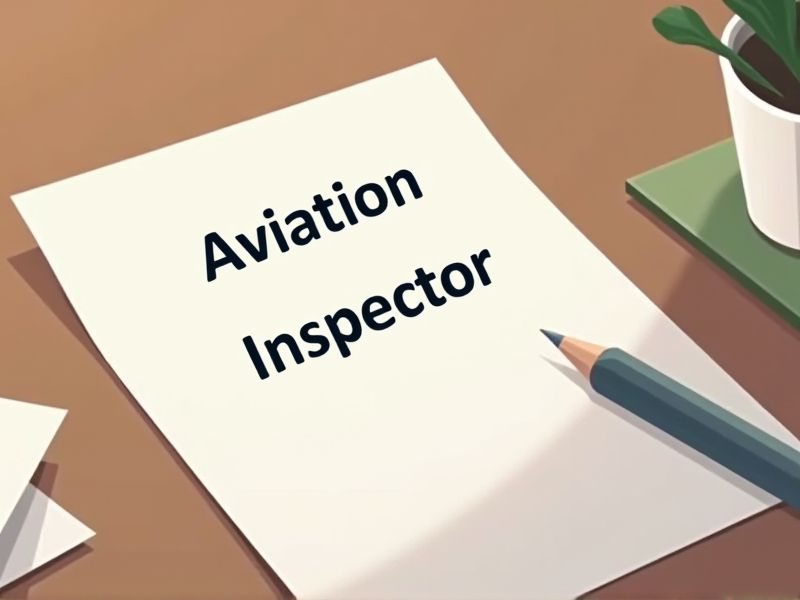
Aviation Inspectors are responsible for ensuring aircraft safety and compliance with aviation regulations. They need specific certifications to gain a comprehensive understanding of aircraft systems and maintenance procedures. These certifications validate their technical expertise and ensure they adhere to industry standards. Below are key certifications often required for an Aviation Inspector.
FAA Airframe & Powerplant (A&P) Certification
The FAA Airframe & Powerplant (A&P) Certification ensures that aviation inspectors possess a deep understanding of aircraft mechanics and systems. This certification, requiring comprehensive knowledge of both airframe and powerplant components, is critical for inspectors to accurately evaluate aircraft safety and compliance. By holding A&P Certification, inspectors are qualified to identify mechanical issues that could compromise flight safety, thereby upholding federal safety standards. The certification also standardizes the skillset across aviation inspectors, ensuring a consistent level of expertise and reliability in inspections.
FAA Inspection Authorization (IA)
The FAA Inspection Authorization (IA) allows qualified aviation inspectors to perform and endorse major repairs and alterations, ensuring compliance with aviation regulations. By holding an IA, inspectors demonstrate their proficiency in assessing the airworthiness of aircraft. This credential also authorizes them to conduct annual and progressive inspections, maintaining safety standards. IA certification establishes a higher level of trust and accountability within the aviation maintenance community.
EASA Part-66 Aircraft Maintenance License
An EASA Part-66 Aircraft Maintenance License equips aviation inspectors with recognized technical proficiency in maintaining and assessing aircraft systems. Regulatory compliance with EASA standards is essential for ensuring safety and reliability in the aviation industry. This license verifies an inspector's ability to conduct thorough evaluations and ensure maintenance practices adhere to stringent quality requirements. With the increasing complexity of modern aircraft, possessing a Part-66 license provides inspectors with the necessary expertise to manage sophisticated systems effectively.
Non-Destructive Testing (NDT) Certification
NDT Certification is essential for aviation inspectors as it ensures they possess the necessary skills to detect potential structural flaws without compromising the part's integrity. Certified inspectors can identify and address safety concerns early, reducing the risk of catastrophic failures during flight. Comprehensive training and certification facilitate consistency and reliability in inspections, which is crucial for maintaining aircraft airworthiness. Regulatory bodies require NDT Certification to comply with aviation safety standards, ensuring uniform quality and safety across the industry.
Aviation Safety Management System (SMS) Certification
Aviation Safety Management System (SMS) Certification for an aviation inspector ensures that they are well-versed in identifying potential hazards and implementing preventive measures. This certification enhances the inspector's ability to maintain compliance with international safety standards, reducing the risk of accidents. Through structured safety protocols, the certification aids in efficient risk management and decision-making processes. With SMS training, inspectors are better equipped to foster a culture of safety within aviation organizations, which is crucial for maintaining public trust and operational efficiency.
AS9100 Aerospace Quality Management Certification
AS9100 Aerospace Quality Management Certification sets a standardized quality benchmark for the aerospace industry, ensuring inspectors possess the necessary competency to evaluate complex systems. This certification mitigates risks associated with aircraft operations by embedding stringent quality measures for safety and performance. Aviation inspectors with AS9100 credentials tend to enhance company credibility, promoting trust amongst airlines and regulatory bodies. Increasing global regulatory demands necessitate a robust framework like AS9100 to maintain airworthiness and compliance, thereby safeguarding passenger and cargo operations.
ISO 9001 Quality Management Certification
ISO 9001 Quality Management Certification ensures aviation inspectors adhere to internationally recognized standards, enhancing consistency and reliability in inspections. This certification helps mitigate risks and improve safety measures, crucial in the highly regulated aviation industry. By standardizing processes, inspectors can identify non-conformities more efficiently, leading to timely corrective actions. Holding an ISO 9001 certification also boosts credibility and trust among clients and stakeholders in the aviation sector.
OSHA Safety Certification
Aviation inspectors must navigate complex safety protocols, which OSHA Safety Certification ensures they fully understand and can enforce effectively. The certification reduces the likelihood of workplace accidents by equipping inspectors with knowledge of the latest safety standards. Proper certification fosters a culture of safety compliance, reflecting positively on the aviation company's reputation. Regulatory bodies require this certification to maintain consistent safety practices across the industry, thereby enhancing overall aviation safety.
Six Sigma Green Belt Certification
Aviation inspectors require Six Sigma Green Belt Certification to enhance their problem-solving capabilities, critical for maintaining high safety standards. The certification equips them with data-driven tools to improve quality control processes, minimizing errors in aircraft inspection routines. Standardization of processes achieved through Six Sigma reduces variability, ensuring consistent compliance with regulatory requirements. By applying structured methodologies, inspectors can recommend and implement effective improvements in maintenance practices, leading to increased operational efficiency.
ICAO Aviation Inspector Training Certification
ICAO Aviation Inspector Training Certification ensures standardized knowledge and skills, promoting safety and compliance in global aviation. This certification aligns inspectors with international regulations, minimizing discrepancies across different jurisdictions. Without proper training, inspectors may miss crucial safety protocols, leading to potential safety risks and accidents. Certified inspectors are better equipped to identify and address diverse issues, enhancing overall operational efficiency and security in the aviation sector.
Summary
When you achieve additional certifications as an Aviation Inspector, you enhance your credibility and expertise, which can lead to increased job opportunities. This professional development might result in higher salary prospects and accelerated career advancement. Certified inspectors may also experience greater job security due to their specialized skills. Employers often prioritize inspectors with certifications, recognizing their commitment to maintaining aviation safety standards.
